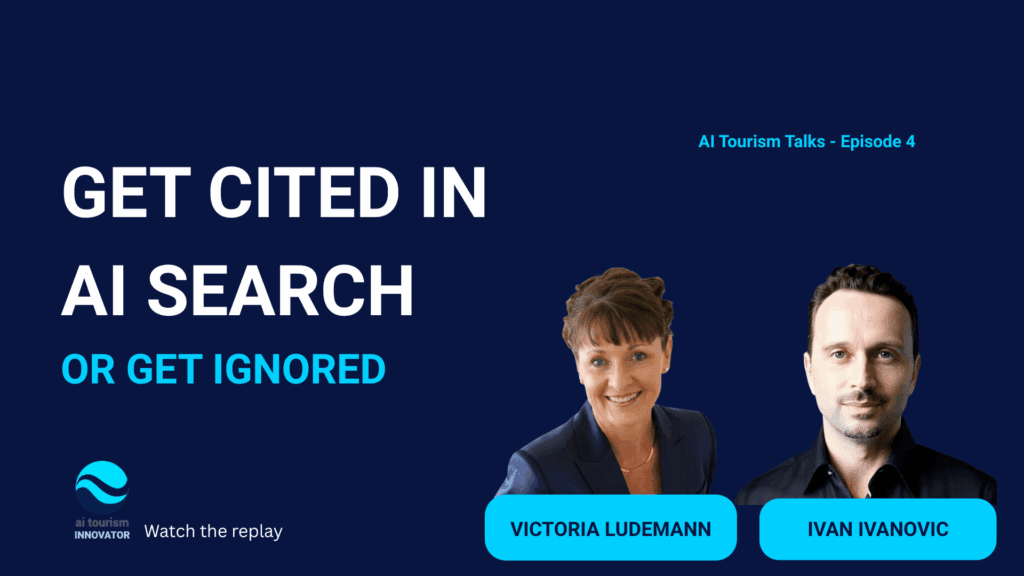AI search is changing how travelers find information, and how tourism brands get seen.
With Google’s new AI Mode, travelers no longer browse ten blue links.
They see a short list of AI-generated answers.
If your brand isn’t cited in those answers, you’re invisible.
That’s the reality we explored in the latest AI Tourism Talks Live with Victoria Ludemann, founder of The AI Marketing Club, one of the leading voices helping tourism and hospitality businesses adapt to the new search era.
Why AI Search Changes Everything
Traditional SEO rewarded backlinks, keywords, and meta tags.
AI search rewards credibility and context.
When travelers ask questions in tools like ChatGPT, Gemini, or Copilot, these models pull information from only a handful of trusted sources, usually 4 to 10.
If your website isn’t among those sources, your visibility (and bookings) quietly drop.
Victoria explained it best:
“AI search isn’t replacing SEO, it’s rewriting it.”
To stay visible, your content must be citeable, trusted enough to appear inside AI-generated answers.
What “Citations” Really Mean
A citation is more than a backlink.
It’s an AI model’s reference to your brand as a credible source.
For example:
“Tourism contributed $41 billion to New Zealand’s economy in 2024 (Stats NZ).”
This format: Claim + Source + Specifics gives AI models confidence to reference it.
That’s why visibility today isn’t about how often you publish, but how clearly and credibly you communicate.
How to Make Your Content Citable
Here are the five most practical tips Victoria shared for tourism and hospitality brands:
1. Use clear sources
Back your statements with data from tourism boards, industry reports, or credible research.
2. Be specific
Use numbers, dates, and real locations, these details increase citation probability.
3. Structure for scanners
Use headings, bullet points, and short paragraphs to help AI (and readers) navigate.
4. Keep it fresh
Update your pages quarterly, AI models prioritize newer data.
5. Add author credibility
Include a byline with your name, title, and short bio to signal authority.
Small tweaks like these help AI engines recognize your expertise and include your brand in their answers.
A Simple Page-Upgrade Checklist
Victoria also shared a simple 5-step audit any brand can run this week:
- Review your key pages (About, Blog, Destinations).
- Add Claim + Source + Specifics to every main section.
Link to reputable data sources (UNWTO, national tourism boards, trusted media). - Add a “Last updated” line to signal freshness.
- Compress visuals, fast loading improves AI crawlability.
In under an hour, you can transform existing content into AI-ready, citeable material.
The Mindset Shift
Old SEO said: rank higher.
New AI search says: be referenced.
The brands that adapt early will stay visible across voice, chat, and visual platforms.
Those that don’t risk disappearing, not because of bad marketing, but because AI never saw them.
Free Resources from the Episode
Victoria Ludemann
The New Page One: 5 AI Search Optimisation Tips to Get Your Tourism and Hospitality Business Found
https://www.theaimarketingclub.com
Ivan Ivanovic
100 AI Prompts for Travel Tech & Tourism Brands
https://ai-tourism-innovator.framer.website
AI Tourism Innovator Weekly
My free Saturday digest with the latest AI travel news, prompts, and case studies
https://ai-tourism-innovator.beehiiv.com
Watch the full 46-minute replay
https://youtu.be/Mo5OW_zRaGU
Final Thoughts
AI search isn’t the future, it’s here.
If your brand isn’t cited, you don’t exist.
Start small.
Pick one page, add one credible data point, and make it citeable today.
The brands that adapt now will own the next wave of visibility in travel and tourism.

